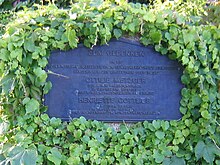Ottilie Metzger

Ottilie Metzger-Lattermann o Ottilie Metzger-Froitzheim (Fráncfort, 15 de julio de 1878 - Auschwitz, febrero de 1943) fue una contralto alemana, famosa intérprete de Wagner en la década de 1910.[1]
Biografía[editar]
Debutó en 1898 en Halle, seguido por Colonia y como primera contralto entre 1903-1915 en la Ópera de Hamburgo, junto a Enrico Caruso. También cantó en Praga, Zúrich, Wiener Staatsoper, Munich, Budapest, Covent Garden y una gira por Estados Unidos dirigida por Leo Blech.
Cantó durante las temporadas 1901-1912 en el Festival de Bayreuth, como Erda en El anillo del nibelungo.[2]
Ottilie continuó como recitalista al retirarse de la escena a menudo acompañada por Richard Strauss y Hans Pfitzner. Sus últimos conciertos fueron en 1933 con Bruno Walter en Berlín y con Otto Klemperer en Dresde.
Casada en primeras nupcias con el compositor Clemens Froitzheim, se volvió a casar en Hamburgo con el bajo barítono Theodor Lattermann que falleció en 1926 a los 46 años.
Con la ascensión de Hitler en 1933, Ottilie Metzger-Lattermann siguió cantando para audiencias judías, con el barítono Erhard Wechselmann, que también perecería en Auschwitz[3]
El empresario norteamericano George Blumental trató de traer a Estados Unidos a Leo Blech y 12 cantantes judíos a cantar la tetralogía de Wagner en Nueva York. Su asistente era Otto Metzger, hermano de Ottilie quien figuró en esa lista[4] El proyecto se desvaneció debido a problemas con las agendas de Blech, Otto Klemperer y Bruno Walter.
Ottilie y su hija huyeron a Bruselas en 1939, pero fueron capturadas por los nazis y deportadas a los campos donde fueron exterminadas.
En 1970, el anticuario Peer Baedeker pidió a Winifred Wagner por una placa recordatoria para los tres cantantes de Bayreuth que perecieron en el holocausto.[5]
Véase también[editar]
Grabaciones[editar]
- mp3 Beethoven In questa tomba oscura (Odeon 1908)
- mp3 ♪ Wagner - 'Siegfried': "Stark ruft das Lied" (1908) ♪
Publicaciones[editar]
- Walter Tetzlaff, 2000 Kurzbiographien bedeutender deutscher Juden des 20. Jahrhunderts, Askania-Verlag, Lindhorst 1982 ISBN 3-921730-10-4
- Joseph Walk, Kurzbiographien zur Geschichte der Juden 1918–1945, München: Saur, 1988 ISBN 3-598-10477-4, S. 234
Referencias[editar]
- ↑ cantabile-subito.de Biography with photos
- ↑ Peter Heyworth Otto Klemperer, His Life and Times: 1885-1933 - 1996 p103 footnote
- ↑ Jüdisches Musik- und Theaterleben unter dem NS-Staat Stephan Stompor, Andor Izsák, Susanne Borchers - 2001 "Zwei Wochen danach gab Ottilie Metzger-Lattermann mit dem Bariton Erhard Wechselmann einen Lieder- und Duette-Abend."
- ↑ George Blumenthal, Arthur H. Menkin My sixty years in show business: a chronicle of the American Theater, 18-14-1934 ([1936]) 1935 p227, 232, p308 "I phoned Ottilie Metzger-Lattermann (widow of Theodor Lattermann and sister of Otto Metzger). She was glad to hear that there were prospects of her going back to America and invited me for lunch at her home on Sunday."
- ↑ Opera Vol.48 1997 p914-5 "The festival's archive, with its correspondence with Hitler and other documentation of the period, is still closed to research. He has not even been willing to have a modest memorial for the three Bayreuth singers who perished in concentration camps. The proposal for a memorial plaque was proposed to Wolfgang ages ago by a retired singer and Bayreuth antiquarian bookseller, Peer Baedeker. And therein lies a revealing story. When the centenary festival opened in 1976 with a wreath-laying ceremony at Wagner's grave, Baedeker placed his own wreath with a ribbon attached, with the words: In memory of Richard Breitenfeld, Henriette Gottlieb, Ottilie Metzger-Lattermann Honoured as festival singers Murdered in Nazi concentration camps. Within 24 hours of the ceremony, the ribbon had vanished. An article about the incident, which later appeared in an Israeli newspaper, was sent to Winifred, who wrote the following ineffable letter to Baedeker: Herr Heinrich Schaar in Munich sends me from time to time cuttings from the Israel Nachrichten, including this one.... Herr Schaar appears to suspect that this was my doing or at my behest, since otherwise he would not have sent me the press cutting. In the first place I had no idea you had laid a wreath, and in the second I seldom go to RW's resting place; since it is now permanently open to the public, it is never possible to visit the grave alone. I myself never heard Frau Metzger-Lattermann in Bayreuth. but I know that my husband had a very high impression of her. Frau Gottlieb sang here in my time and I had a high opinion of her as well. Herr Breitenfeld is unknown to me. But were all three really killed at Auschwitz? I would doubt that in the case of Frau Lattermann, since she must have been terribly old. With best wishes, also to your wife, whom I recently greeted in front of Wahnfried." --- The casualness of this brush-off, the brutal indifference to the murder of three old singers speaks volumes about the attitude in Bayreuth to its past. And so the monument that the festival visitor sees today on the Green Hill — the massive copy of the bust of a glowering Wagner made for Hitler by the Nazi sculptor Arno Breker — is, properly viewed, a brazen symbol of Bayreuth's
Enlaces externos[editar]
- Berlíner Morgenpost (enlace roto disponible en Internet Archive; véase el historial, la primera versión y la última).
- „Verstummte Stimmen“ Die Vertreibung der „Juden“ aus der Oper 1933 bis 1945; Eine Ausstellung des Hamburger Abendblatts in Zusammenarbeit mit der Hamburgischen Staatsoper, unterstützt von der Axel Springer Stiftung (enlace roto disponible en Internet Archive; véase el historial, la primera versión y la última).
- bio y fotos
- Mujeres
- Nacidos en 1878
- Fallecidos en 1943
- Cantantes líricos de Alemania
- Contraltos de Alemania
- Músicos que abandonaron la Alemania Nazi
- Fallecidos en el campo de concentración de Auschwitz
- Músicos clásicos de Alemania del siglo XX
- Músicos asesinados
- Mezzosopranos y Contraltos en el Teatro Real
- Nacidos en Fráncfort del Meno
